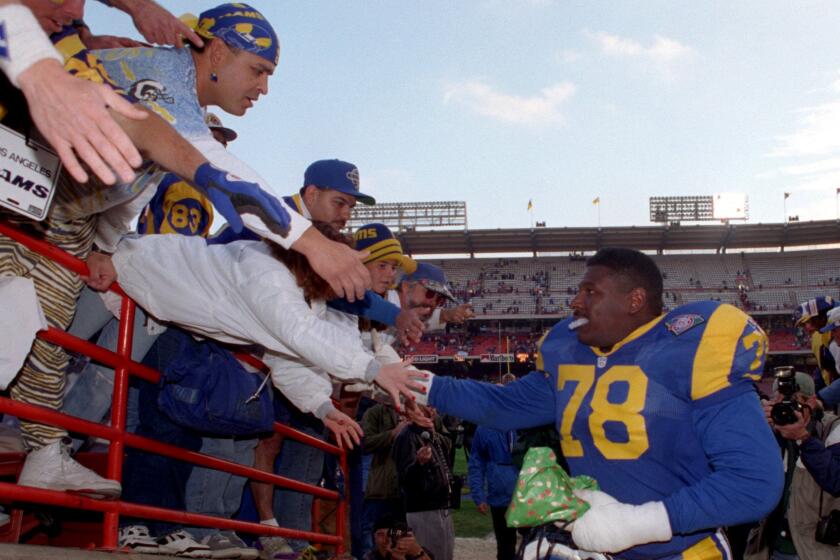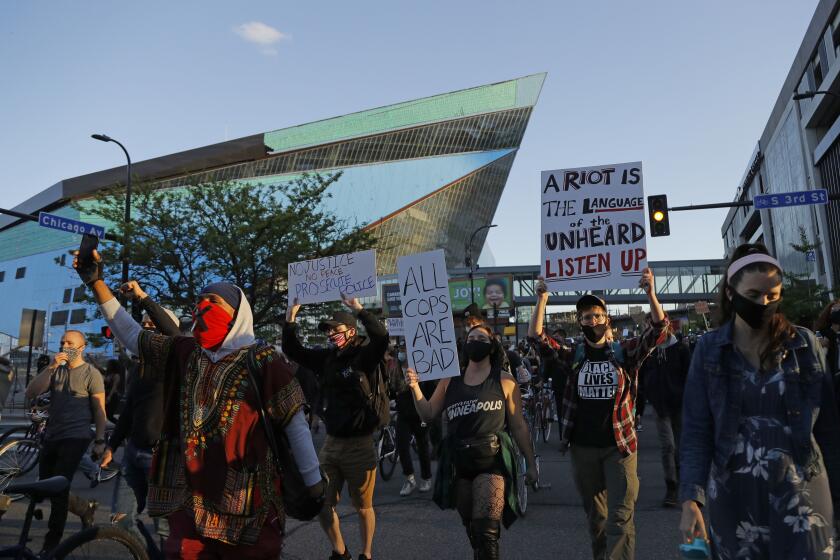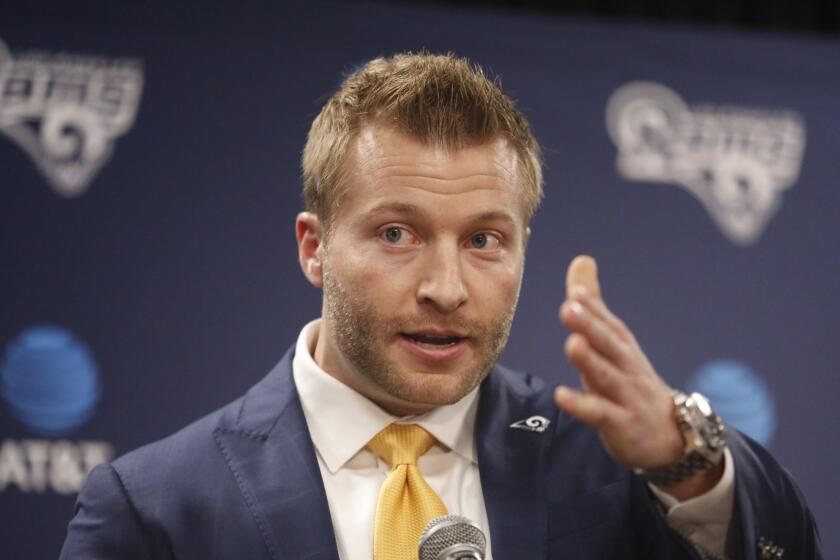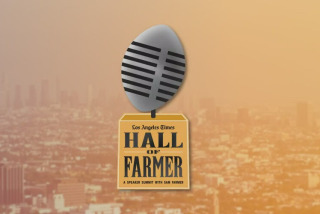NFL players getting their message out in aftermath of George Floyd death
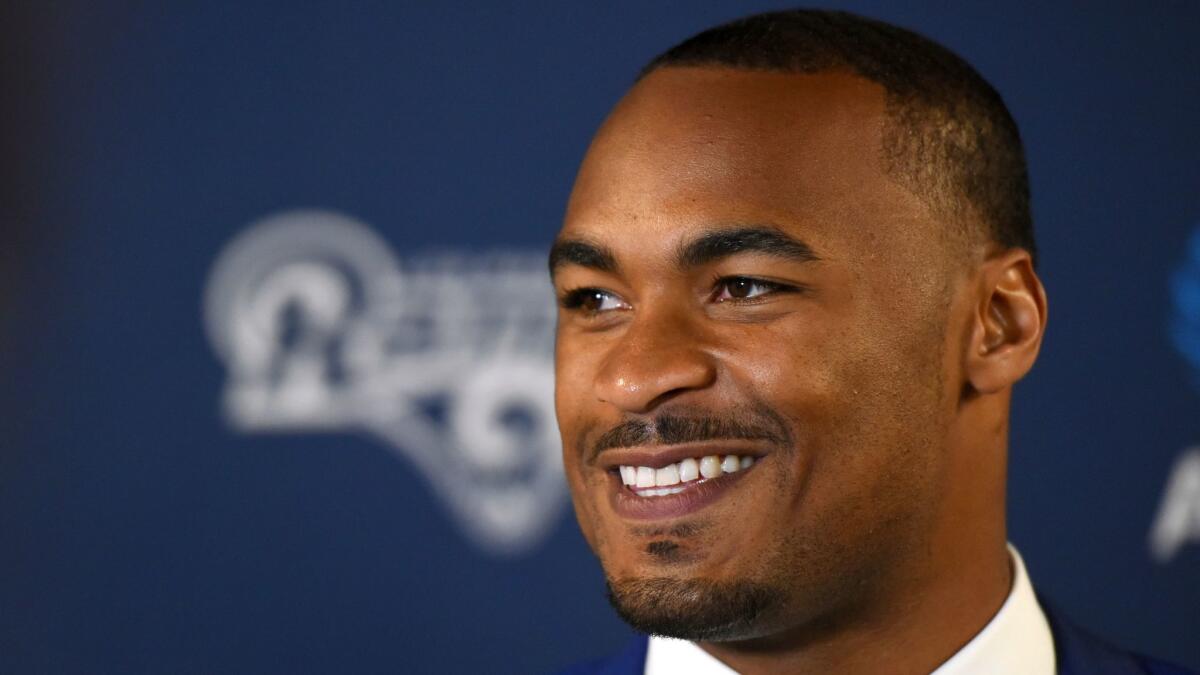
- Share via
Robert Woods remembers the encounters with police.
As a teen, the Rams receiver said he and his friends were questioned by officers about why they were attending a movie at a theater not in their city. In another instance, Woods said he was pulled over by police at gunpoint during a routine traffic stop.
“Things like that, you get numb to it,” Woods said Wednesday when asked about growing up Black in Los Angeles.
But the video of a Minneapolis police officer with his knee on George Floyd’s neck was “traumatizing,” Woods said during a videoconference with reporters.
Floyd died May 25 after the white officer knelt on his neck for more than eight minutes while restraining him. The officer, Derek Chauvin, has been charged with second-degree murder and second-degree manslaughter. Three other officers have been charged with aiding and abetting second-degree murder.
Floyd’s death, which spawned worldwide protest, “put a spotlight” on police brutality, racism and other social issues, said Woods, the 28-year-old who grew up in Carson and attended Gardena Serra High and USC.
While the coronavirus outbreak will make for a unique 2020 season, the Rams endured a pair of unusual seasons in the 1980s.
In Minnesota, the Vikings on Wednesday organized a video media conference that included team executives and players discussing how they have been affected by Floyd’s death and discrimination at large.
“My father marched from Selma to Montgomery with Martin Luther King,” Vikings running back Ameer Abdullah said. “So a lot of those things are rooted in who I am. So 2020 has really hit me hard, personally. I live in Atlanta, and to experience Ahmaud Arbery [who was fatally shot] in February, and then in the very city I live in during the season it was George Floyd. It was two gut punches to me.
“But it was also a wake-up call that this has been a persistent and prominent issue in America for centuries. We all know that change doesn’t happen overnight, but we have to learn from our history to begin to fix a lot of these things that are going on.”
The Vikings announced that the team’s ownership, the Wilf family, will be making a $5-million contribution to various social justice causes, and is establishing a scholarship in the name of Floyd.
NFL Commissioner Roger Goodell released a video Friday saying the league was “wrong” for not listening to players earlier about inequality and police misconduct, and encouraging “all to speak out and peacefully protest.”
Asked about that, Vikings linebacker Eric Kendricks said that while the video didn’t solve anything, it was a good first step.
The Minnesota Vikings participated in a video call to discuss race relations, police brutality, criminal justice reform and more in wake of George Floyd’s death.
“We wanted to be acknowledged,” said Kendricks, who had appeared in a video with several of the league’s star players demanding change. “We wanted it to be out there. It’s uncomfortable for everybody. Obviously, we play football and we want to keep it on football as much as possible. But these are issues that we’re facing in a majority of the players’ communities. For us to feel like we can’t speak up about it, it just didn’t feel right.
“Finally having Goodell say those things and having our back, I feel like we can all move forward now.”
Because of the COVID-19 pandemic, NFL teams are conducting virtual offseason programs. But in the wake of Floyd’s death, issues have been discussed and experiences shared during emotional team meetings.
Rams quarterback Jared Goff last week posted to Instagram that, “It is my responsibility to educate myself and actively participate in advocating for the change our country desperately needs, in words and action.”
Goff said Wednesday that it was important “for white people, and especially white football players, and specifically myself as a white quarterback to stand up and say something and to take action” by standing for the Black community and social justice.
Moving forward, players feel more emboldened to make their voices heard in team meetings and in public spaces, including NFL stadiums.
Woods referenced Colin Kaepernick, the former San Francisco 49ers quarterback who in 2016 knelt during the national anthem to protest police brutality and racial oppression in the United States. No NFL team has signed Kaepernick since.
“Back when Kaepernick took a knee it was almost kind of scary,” Woods said. “You could lose your job, you could be on the bench.
“I think now being able to have a voice, knowing that your political views shouldn’t matter … I think you’ll be able to see players speak up on what they believe in and have the confidence that their team is able to back them.”
Chargers running back Justin Jackson, citing cellphone videos such as the one involving Floyd and others that have captured violent police interactions with protestors, described the moment as a perfect storm for the social justice movement and Kaepernick’s original message to flourish.
“People are finally starting to see like, ‘Wow, he was right. What he was talking about back then, we didn’t understand because we didn’t see it or we chose not to see it,’ ” Jackson said during a videoconference with reporters. “Now, that’s not really a choice you can make. ... He should feel very vindicated.”
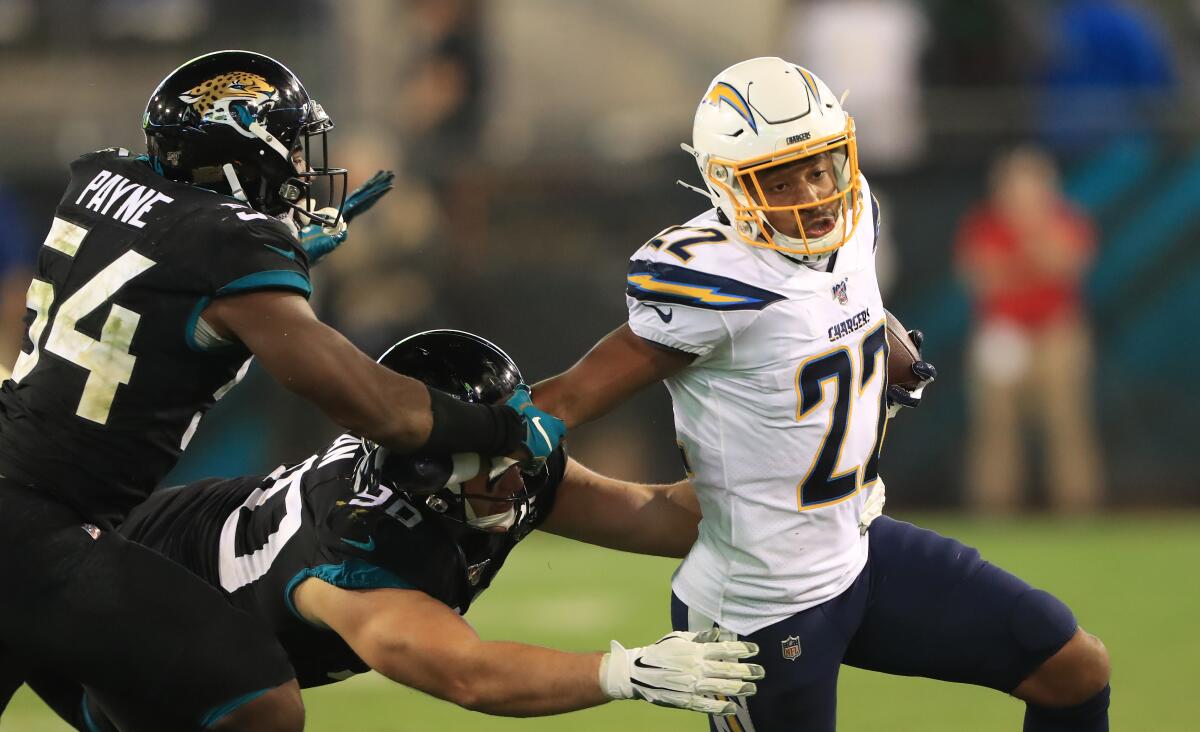
In 2016 and 2017, the message Kaepernick and others intended was dulled down and diverted by others “to avoid the conversation,” 49ers cornerback Richard Sherman said.
About 125 players, coaches and staff of the Rams participated in a videoconference to discuss the death of George Floyd.
“This time it’s too full-fledged and most people are actually getting the messaging and seeing it first-hand,” Sherman told reporters Wednesday. “Nobody can turn their eyes away. Nobody can turn away from what they’re seeing. Any human with any true empathy in them for their fellow human being would feel that strong.”
How players express their views individually and collectively once the season begins will be determined in time, Woods, Goff and Jackson said. Training camps are scheduled to open in late July.
In the interim, players will continue to find ways to make their feelings known.
Jackson said that he has participated in protests, and that he and Chargers defensive end Isaac Rochell will take part in an organized walk this weekend in Los Angeles.
Last year, Woods participated in a public service announcement for the LAPD. In the spot he said the department was seeking officers who would “see every human as a unique person they are and can make smart, unbiased and just decisions.”
Woods said Wednesday that he would continue working on police reform. He also has pondered holding an autograph signing event at a location that will rally attendees to vote.
“It’s time to get involved, whatever skin color, job, profession,” he said. “I think it’s that time to take action.”
More to Read
Go beyond the scoreboard
Get the latest on L.A.'s teams in the daily Sports Report newsletter.
You may occasionally receive promotional content from the Los Angeles Times.
